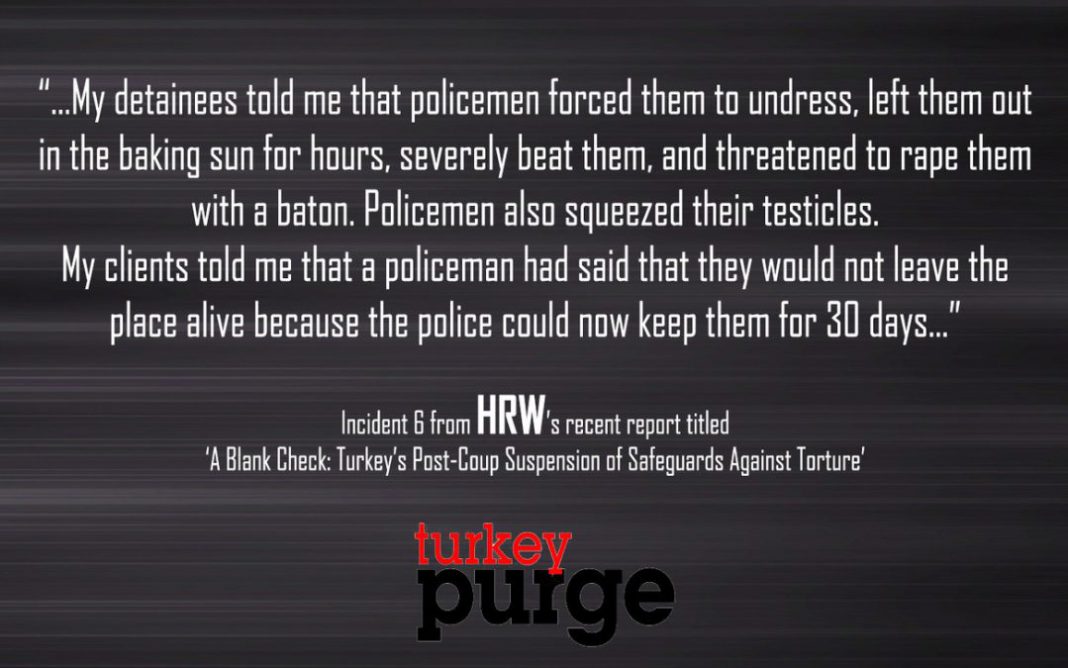An Istanbul-based lawyer told Human Rights Watch (HRW) that police officers tortured her two clients by squeezing their testicles and forcing them to undress, another indication of the re-emergence of cruel torture methods in Turkish prisons.
In a 43-page report, “A Blank Check: Turkey’s Post-Coup Suspension of Safeguards Against Torture,” published on Tuesday, HRW documented 13 specific abuse incidents concerning Turkey’s post-coup detainees. The alleged abuse cases ranged from use of stress positions and sleep deprivation to severe beatings, sexual abuse and the threat of rape.
HRW said it had interviewed more than 40 lawyers, human rights activists, former detainees, medical personnel, and forensic specialists before preparing the report.
The watchdog said Turkey’s post-coup emergency decrees facilitated torture as they removed safeguards against ill-treatment.
What follows is the full text of the sixth abusive incident in the series published by HRW on Tuesday.
“Gülhan Kaya, an Istanbul–based lawyer, told Human Rights Watch that police in Urfa had tortured two of her clients during detention. The two had been detained on suspicion of being members of an armed outlawed organization, the Marxist-Leninist Communist Party.
“Around noon on July 23, security forces in Urfa detained Mehmet Ali Genç and Metin Kösemen on the street. The family of one of the detained contacted Kaya who asked lawyers in Urfa to immediately meet with the detainees. The lawyers were not able to do so, however.
“Kaya said that she flew to Urfa herself on July 25 and finally managed to see her clients around 2 p.m., more than 48 hours after their detention. On that day she spoke with her clients in private, she said. During subsequent meetings, however, the police was present following the prosecutor’s instructions.
“The detainees told Kaya that police had taken them to three different police-stations before taking them to the anti-terror department. ‘Their stories were unbearable, like a throwback to the 1990s,’ Kaya said.
“Kaya said the detainees told her that the police forced them to undress, left them out in the baking sun for hours, severely beat them, and threatened to rape them with a baton. The police also squeezed their testicles. According to Kaya, the detainees told her that a policeman had said that they would not leave the place alive because the police could now keep them for 30 days, referring to the extended period of police detention under the emergency decrees. Human Rights Watch also heard from other detainees the allegation that police specifically intimidated them with reference to the extended period of police detention.
“Kaya said she observed that her clients had bruises on their stomachs, backs, and shoulders and scratches on the side of the face. One detainee had a mark on one of his shoulders that looked like a burn wound, she said.
“At some point, Kaya said, the detainees asked if they could speak with a male lawyer so that they could tell all the details. Kaya said it was not possible, however, to get them a male lawyer.
“The detainees told Kaya that they had been brought to medical personnel for examination on several occasions. On one occasion, however, the doctor didn’t see them at all. They remained in the car while the police picked up the medical examination report from the doctor. On another occasion, a doctor wanted to conduct a proper examination after seeing their condition. The police, however, took him aside and when they came back the doctor signed the medical examination report without any examination. They received a thorough medical examination the day before the court hearing, which took place 12 days after their detention, they said.
“When the lawyer tried to obtain a copy of the medical examination report, the police told her, after consulting with the prosecutor, that she could not see the document because of the state of emergency.
“Kaya was able to consult the case file for five minutes before the interrogation of her clients, learning that they were accused of being members of the Marxist-Leninist Communist Party.
“The prosecutor denied Kaya’s request to meet with her clients to prepare them for the court hearing to sanction the arrest. During the hearing the judge said that they were accused of belonging to an illegal organization, but neither he nor the prosecutor presented any evidence.
“During the hearing, the two detainees told the court that they had been tortured in detention, but the judge stopped them after a few sentences, saying that this was not relevant and that it was not his business, Kaya said. Kaya said that marks of apparent ill treatment were still visible on her clients at the time of the court-hearing, 12 days after their detention.
“Kaya has filed a complaint with the prosecutor regarding the alleged torture of her clients by the police.”
